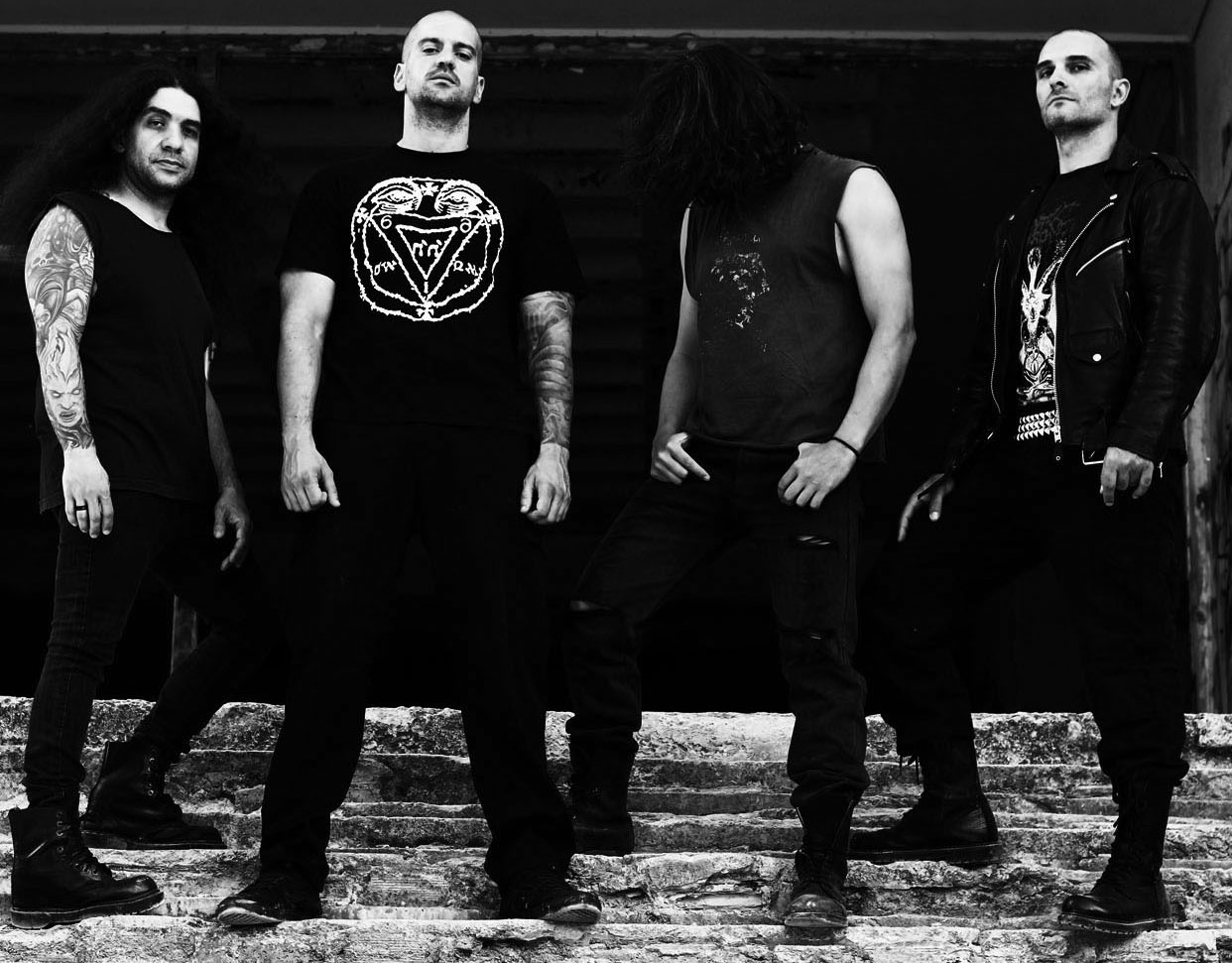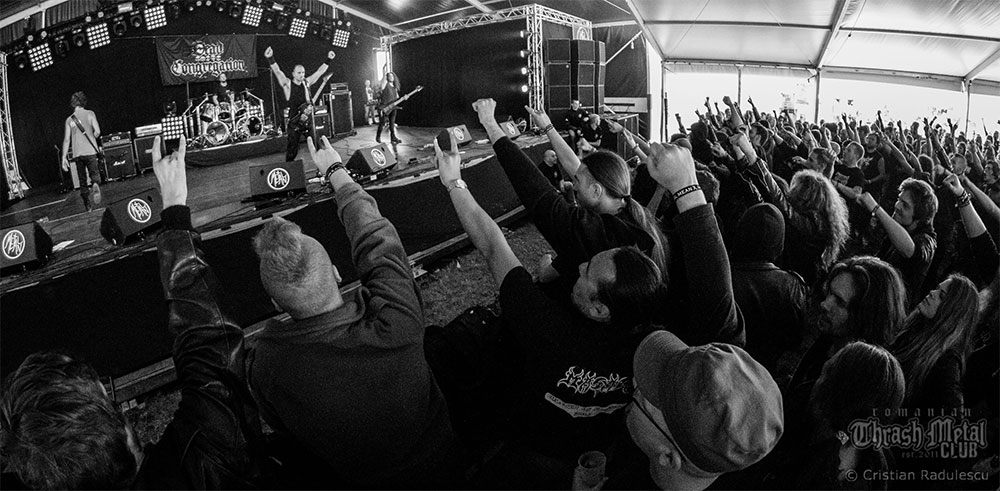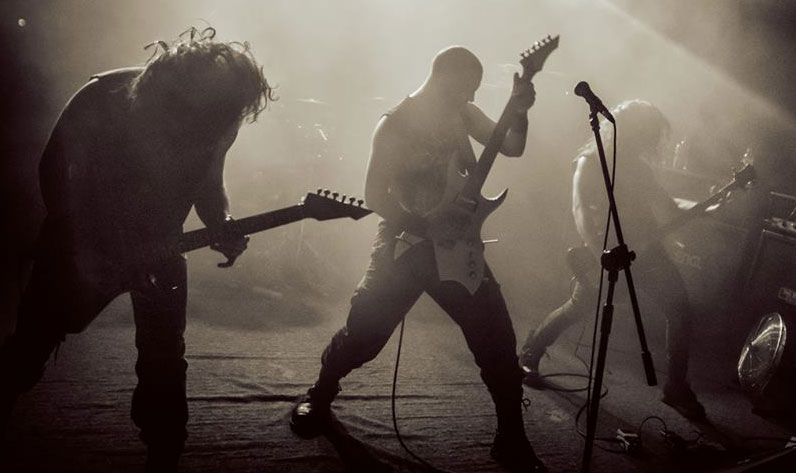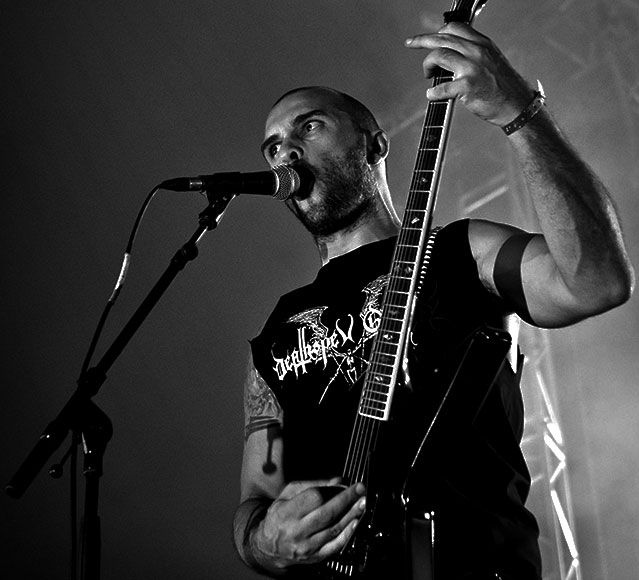Dead Congregation
2016-12-07
by Niklas Göransson
Living up to his reputation as a man with outspoken principles, Anastasis Valtsanis of Greek death metal quartet Dead Congregation discusses the rewards and tribulations of following his uncompromising conviction in artistic integrity.
– There were big-label offers even as we were preparing our first record, says guitarist and vocalist A.V. (Anastasis Valtsanis), but those contracts with their seemingly endless clauses only gave me a headache. I’ll never hand my music over to someone who sees my band as a monetary product, nor will anyone be exploiting our creative talent for their own financial gain.
When debut “Graves of the Archangels” was released in 2008, DEAD CONGREGATION had previously produced the 2005 EP “Purifying Consecrated Ground” and established themselves as a solid live act. They chose to release the album themselves, a strategy still employed to this day.
– I don’t know if our way is better or worse – we’ll never know where we would have been today had we chosen a different path.
While 2014 follow-up “Promulgation of the Fall” was being recorded, they briefly entertained the notion of moving to a bigger label for one record only. Alas, as he would soon be made aware, this is not how the major players operate.
– All of them wanted to sign us for a minimum of three albums – arguing that the efforts invested in promoting us would be in vain should we move to another label for the next release.
This did not sit well with Anastasis.
– I’ll tell you what, sir – this is not a demo band looking to be signed – you’re after one of the most relevant acts of today. One, may I add, that happens to outsell many of the ‘established’ names on your roster in both albums and concert tickets.
If anything, he believes labels should place greater value into what a veteran band brings to the table.
– Should we just commit to three albums over who-knows how many years, then keep our fingers crossed and hope it will work out for us?
He scoffs.
– No thanks. I’d rather be independent with no promotion at all and be my own master. Note that we play death metal and will as such never reach the popularity of METALLICA – so who cares if we lose a small chunk of potential audience without a label ‘backing us up’, as they call it.

DEAD CONGREGATION is probably the only prolific metal band from Greece I can think of that does not display any elements of the classic Hellenic sound.
– I’m not a big fan of the Greek scene, to be honest. I like early ROTTING CHRIST as well as a couple of other recordings here and there but by the time it had started to evolve I was already deep into death metal and couldn’t really relate to the local stuff.
The scene’s famed sonic characteristics consist of as much atmosphere and emotion as melody and tempo, Anastasis has a rather pragmatic take on its origins.
– I think it primarily came from poor musicianship; the band members weren’t on par with their influences on a technical level, so what they lacked in skills they made up for with passion and melody.
He remembers his local scene of the early nineties as one of huge variety, with a host of bands that all sounded unique.
– Then came the godly “Thy Mighty Contract” in 1993 and everyone wanted to be ROTTING CHRIST. That’s when I started losing interest.
This legendary style is oft described in terms such as ‘occult’, ‘eerie’ and so on, and I’m curious how Anastasis would define it.
– Staccato riffs with melodic lines, drum machine and funny accented vocals? Doesn’t sound very appealing on paper, admittedly, but it’s very atmospheric in an ominous way when done right.
In the past decade, the country’s financial crisis has garnered significantly more coverage than its black metal scene. The economic adversity with subsequent public and parliamentary unrest was heavily reported on until early 2015, but has gone largely unmentioned over the past year – so I’m left wondering if things are on the upswing.
– Our situation has most certainly not improved, it’s worse than ever actually. People are so used to having increasingly less money that they cease being surprised about new taxes on everything; it will however come to a point where they won’t be able to survive. You can only draw so much blood out of stone. Politics suck – fuck politics.

As we will soon come to learn, there are a great number of things that irk Anastasis. One example being the phenomena where modern underground fans dig out old nineties bands that no one cared about at the time, only to proclaim them a ‘well-kept secret’.
– What a joke, really. As if anyone will ever be able to convince me that this supposed forgotten relic of a demo from blah-band is as good as “Left Hand Path” (ENTOMBED) or “Altars of Madness” (MORBID ANGEL) – ha!
He adds that this obviously doesn’t rule out the existence of neglected treasures.
– DEMIGOD and SADISTIC INTENT got no recognition until the early 2000s. Hell, even INCANTATION and ANGELCORPSE were overlooked ten years ago! How things change, huh. Overall there’s a swarm of completely redundant re-issues that a select group of people praise as special. Special my ass.
Perhaps one reason cult-connoisseurs latch onto forgotten albums is because the bands never went on to make fools of themselves, at least not in the public spotlight, like many of their more commercially prosperous peers have.
– Sure, it’s also because now with the internet there’s not much mystery left – so people who want to feel part of a scene elite do so by namedropping bands no-one has heard of. I suppose it could also be something much simpler, such as having poor taste altogether.
Can you still go back to the classic albums of bands that have become conceptual and musical parodies of themselves?
– I don’t have a problem with bands who lost their genius along the way. METALLICA having become a sheer caricature today doesn’t mean I can’t listen to “Ride the Lightning”, does it?
Larger-than-life acts like that, sure – it’s different when it comes to death or especially black metal; music that needs to be taken seriously. There are for instance certain Norwegian albums I used to worship that I just can’t listen to today due to the contemporary antics of the musicians.
– I’ve never been particularly into Norwegian black metal. The main reason being the shock I got when eagerly expecting DARKTHRONE’s follow-up to “Soulside Journey”, and then getting “A Blaze in the Northern Sky” instead of a death metal album.
The trauma was so severe that it made Anastasis completely avoid black metal for the following years.
– I know what you mean though, but as an example; I will forever worship the first two DARK FUNERAL albums, regardless of the joke they made of themselves later on. It’s enough for me to simply avoid the releases I don’t like.
What about modern black metal?
– I’ve been listening to the new ANTAEUS lately – holy shit, black metal is fucking dangerous again.
Anastasis makes an interesting point how back in the tape-trading days, not many bands were purposely trying to remain in the underground. Those left in obscurity were stuck there because they weren’t attracting enough public attention to warrant a record deal.
– In the past, there wasn’t such an abundance of underground labels. The few that existed focused on releasing the cream of the crop, so to speak, whereas nowadays there are almost more labels than bands.
Thus, there will always be someone who likes a recording enough to release it – if only on a small scale.
– Even the bigger labels are now signing insignificant bands, he continues. After seeing their sales drop dramatically from internet downloads and streaming, they’re scrambling to secure their piece of the underground pie. So yeah, there’s no real filter anymore on what deserves a release and what should remain in the gutter.
That’s a huge problem when you think about it, he points out, as bands are robbed of their incentive to improve. With labels eager to release whatever shit that can be thrown together, the pedestrian artist will be unable to recognise the mediocrity of his or her work.

One important aspect of the underground has long been fanzine culture; amateur cut-and-paste publications, fuelled by passion, was how one would stay up-to-date. Putting out a printed ‘zine required serious effort though, which perhaps acted as somewhat of a dedicational barrier. Has the online availability been detrimental to metal media then, I wonder, providing also a platform for us unentrepreneurial plebeians.
– I’m more comfortable reading a zine than an article on the internet, that’s for sure. I spend way too much time in front of a computer screen as it is. Too many people are given a voice these days, it seems to me.
Anastasis speculates that most of the online metal media consist of people who are themselves devoid of artistic talent, unable to create their own music. Wanting sorely to be part of ‘the scene’ – they worm their way in by writing about those capable of composing, in hopes of appearing relevant.
– There are of course always exceptions, and one might even come across an interesting online article or review here and there. The scale is definitely tipped in favour of the bullshitters though, those who rush to judge without any knowledge of what they’re on about.
Partly due to the availability of home-recording software, he says, the metal underground has become a haven for the generic. Anyone in possession of an internet connection can swell their own vomit into the deluge of releases flooding an already badly saturated market, burying the rare gems under torrents of inanity.
– The internet definitely plays a huge part in the scene’s overexploitation. True gold will always find its way to the surface, one way or the other, but some is sadly ignored.
Care to give an example?
– ARKHON INFAUSTUS, one of the most ingenious bands post-2000. Maybe their triggered drums are too much to swallow for the average underground culter-than-thou fan, who probably ignores that even “Altars of Madness” has them.
Studio recording techniques is another factor that separates DEAD CONGREGATION from many of their contemporaries. Deeming click-tracks responsible for castrating a composition’s organic energy, they aim to make the recording experience reminiscent of a rehearsal session.
– As Vagelis is recording the drum tracks, not only are both guitars playing along with him to give the full dual-layered feeling; we’re actually present in the room, headbanging like crazy – swept along by the power of the material.
Their physical presence and participation generates a synergistic spark, which the drummer is able to channel into his percussional delivery.
– The string-instruments are laid down in mostly one take, leaving behind a lot of sloppiness in the recording. You can spend all the mixing time in the world correcting and overdubbing mistakes but we aren’t the most technical and tight musicians, so why fake it?
DEAD CONGREGATION never rehearse songs written by individual members until they are composed in their entirety, which I find intriguing. There’s no exchanging of ideas or jamming to test them out.
– To me, ‘jamming’ together material in rehearsal basically means you have a writer’s block and need someone to help you with ideas on the direction of your composition. Like, ‘Hey, I have this cool riff dude – do you have something we can patch it along with to make a killer song?’
With a strong belief in one’s vision and material, he says, there should also be the confidence to see it through without external assistance.
– The song’s core will always be complete before we start rehearsing it, but sometimes a riff or tempo might not work as planned and so it’s adjusted. Again – by no means is this superior to any other method, it just happens to be the way we work.

Does it ever happen that trends bring about something positive?
– I’d say they can be marginally beneficial to the scene. There will always be a pioneering band stirring the waters, and chances are that the first wave of bands that follows in its wake will hold a high standard.
The post-millennial old-school death metal wave for instance – for which my interviewee could be held partly accountable via releases from his old label, Nuclear Winter. This era provided a platform to quite a few bands who would have been unlikely to rouse much attention without the subsequent hype.
– I can’t remember who started that whole ‘raw, back to the fundamentals’ kind of death metal, but with REVOKATION, KAAMOS and REPUGNANT came bands like VERMINOUS and TRIBULATION, who were also amazing. The whole thing got saturated quite fast though.
DEAD CONGREGATION have themselves played a significant role in propelling a sub-genre back into popularity, what Anastasis calls ‘darkened US death metal’.
– We wanted to remind people that, yes – death metal is about having a dark atmosphere, but it must also be backed up by music. Along with a few others, we sort of ignited the whole ‘cavernous’ sound.
Alas, he observers, now there’s an abundance of bands going for the same suffocating atmosphere. This is however nothing he loses much sleep over, being blissfully unburdened by troublesome concerns over which direction the winds of fashion are presently howling.
– We’ve always been open with our sound – there are black metal parts popping up out of nowhere, unexpected melodies and whatnot. We do not limit ourselves in any way, there’s no material we’ll discard because it’s not ‘appropriate’ for us. It’s us who define our sound, not vice versa.
While they’ll never deviate from their core of dark death metal, any development will be by creative design rather than adaptations to commerce.
– If you choose a more lucratively viable route in hopes of solving your financial woes then you’re in the wrong business, let me tell you. No one gets rich playing metal these days, stay fucking true to yourself and if that doesn’t pay the bills – go flip a burger. It’s far more decent than whoring your band out.
Broadening one’s style, Anastasis adds – or even deviating from what’s traditionally thought of as death metal, doesn’t necessarily mean there’s corruption afoot. After all, art should have no boundaries.
– TRIBULATION for example, are not death metal anymore – so what? They decided to broaden their horizons, it’s what felt right to them and what defined them as artists in that specific period in time.
If disappointed by a band’s change of direction, he advises, one is free to move along to the next one – seeing as there are a great number of them out there. Regardless of what the listenership might think, maintaining artistic integrity is paramount.
– Spirituality and art are intrinsically linked. An artist who creates with the sole purpose of feeding his hunger for the craft elevates to unearthly planes during the process, oftentimes subconsciously. One might have a good ear or technical ability to put two notes together but if it’s not coming from the heart – the spirit, you can see right through it.



